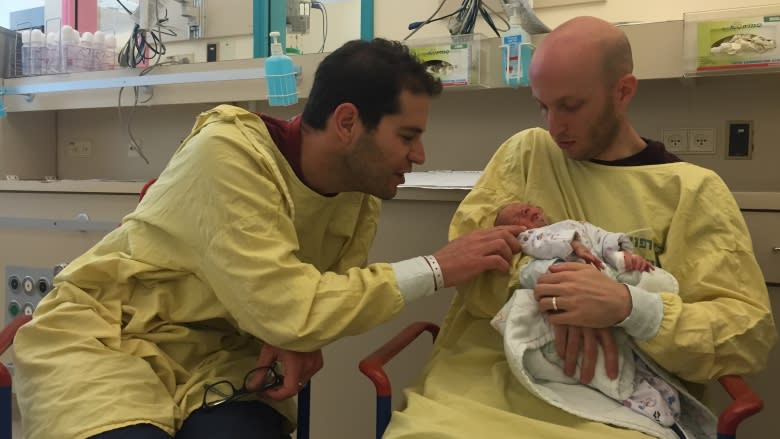Israeli airlift of Nepal babies fuels debate around surrogate mothers
The phone call the Greengolds received a week ago brought joyous news: their baby boy had just been born to a surrogate mother in Nepal.
Gilad Greengold and his husband Arif Vogel Greengold grabbed their already-packed bags and flew to Kathmandu. They landed hours before Saturday's devastating earthquake struck.
"During the (taxi) ride the earthquake hit and it was super strong, super scary. In the middle of the road, everyone was afraid, shocked," said Gilad Greengold.
The Greengolds had to walk to the Kathmandu hospital, where dozens of babies are born to surrogate mothers. Gay couples as well as straight women and men wanting a baby on their own are barred from the surrogacy process in Israel, and Nepal has become the number one destination for these parents.
A nurse located their boy, Ya'ari, who arrived five weeks premature. He was being cared for by nurses in the parking lot, as part of the hospital was damaged in the quake.
"That's the first time we saw him. In the parking lot," Greengold said. "It was chaotic. It was scary. You couldn't understand who's alive and not alive. And then all of a sudden you see this miracle."
For the next four days, aftershocks rocked Kathmandu. Doctors and nurses caring for Ya'ari and three other babies delivered to surrogates placed them inside a small car in the parking lot. At night, they started the engine and turned on the heat to keep the babies warm.
"We were scared. We were terrified, because they couldn't evaluate the baby's condition - because they didn't have the monitors and the equipment and everything," said Greengold, as he held his son at the neonatal intensive care unit at the Schneider Center for Children's Medicine in Petah Tikva, Israel.
Babies airlifted
Ya'ari is one of 26 babies airlifted by the Israeli government, brought to Israel to be with their parents. Their rescue has highlighted the complex and controversial system that forces many Israelis to rely on international surrogate mothers and facilities in Nepal.
Parents pay around $85,000 for the procedure, compared to the average cost of $180,000 if they seek surrogacy in the United States.
Tammuz International Surrogacy, the largest agency in Israel, has helped arrange about 400 births to surrogate mothers in Nepal, Thailand and the United States since it was founded in 2008.
Tammuz has another 75 pregnancies in progress, most involving surrogate mothers from India set to give birth in Nepal.
The organization went into crisis mode on Saturday, working with the Israeli government to arrange transport for the babies and parents that were in Nepal when the earthquake struck.
Israeli officials are also working to have a handful of surrogate mothers in Nepal brought to Israel, to be with their Israeli parents.
"I know that all the parents, they want the surrogates to come here," said Roy Youldous, the marketing manager at Tammuz. "It's better for them to be here. There the situation in Nepal is not good now. It's a disaster in the streets."
Moral, social debate
Surrogacy advocates say they hope the headlines made by the return of Israel's surrogate babies born in Nepal will spur change.
"I am certainly hoping that the Nepal earthquake will encourage Israel to take another look at its approach to surrogacy, to look at it with an eye to the moral and social issues of today," Rabbi Seth Farber, an expert on Israeli religious bureaucracy, told the Times of Israel.
Legislation was introduced to Israel's parliament, the Knesset, in 2013 that would have opened Israel's surrogacy system to gay couples and singles. But it failed to make it past first reading, disappointing those close to the issue.
Although it sponsored the emergency airlift of babies from Nepal, the Israeli government has made no statements in recent days on changes to its views around surrogacy arrangements within Israel itself.
"We think that surrogacy in Israel … should be open to everybody, because it's discriminating and it's unethical to offer it only to certain groups in the population," said the Tammuz agency's Youldous.
There's been something of a baby boom in Israel's gay community in recent years, with hundreds of couples going abroad to find surrogate mothers. LGBT advocates hope soon Israeli parents will be able to seek surrogacy at home.
"You want to be able (to do) what every couples do, just to get the same rights," said Gilad Greengold, who married his long-time partner in New York last year. Israel does not allow same-sex marriages, but does recognize marriages performed in other countries, including Canada.
Before returning to care for his baby, Amir Vogel Greengold praised his government's response to the plight of surrogate children in Nepal.
"We ask (Israel) to change (the surrogacy laws) so we can do it in Israel. But we have also good words to say for our government, because I don't think any other country in the world would do what they did for the citizens that were stuck in Nepal."




